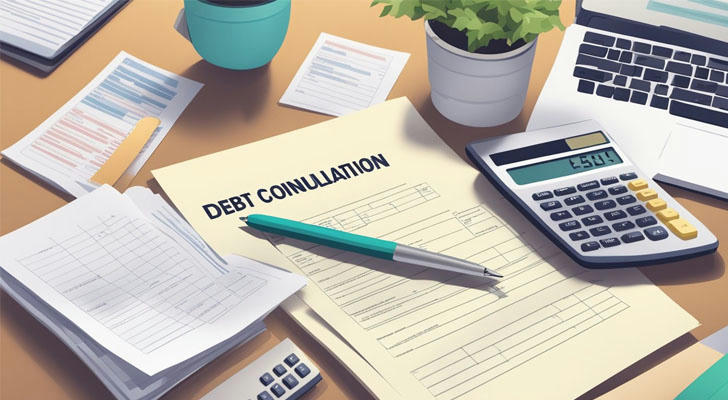Debt Consolidation Plan: How to Gradually Ease Your Financial Burden
Debt can feel overwhelming, especially when multiple loans or credit cards with high interest rates accumulate. However, a debt consolidation plan can provide a structured path to regaining control of your finances. This article explores the concept of debt consolidation, the options available, and how this strategy can ease your financial burden and help you regain financial stability.

What Is Debt Consolidation?
Debt consolidation involves combining multiple debts into a single loan or credit product, usually with a lower interest rate. This approach simplifies debt management by merging your monthly payments into one, reducing the stress of juggling multiple due dates and varying interest rates. Instead of making payments to multiple creditors, you focus on repaying a single lender, making it easier to stay on track.
How Debt Consolidation Works
When you consolidate your debt, you take out a new loan to pay off your existing debts. This loan could come from a variety of sources, including a bank, credit union, or an online lender. Depending on the type of loan you choose, the amount you borrow, and your creditworthiness, the terms of the consolidation loan could vary, but the key benefit is often a lower interest rate, allowing you to save money over time.
For example, if you have high-interest credit card debt, consolidating this debt into a lower-interest personal loan could reduce the total amount you pay in interest, freeing up money for other expenses or savings.
Benefits of Debt Consolidation
1.Simplified Payments One of the biggest advantages of debt consolidation is that it simplifies your financial life. Rather than keeping track of multiple payment dates and amounts, you only need to make one monthly payment to your lender. This reduces the chances of missing payments and incurring late fees.
2.Lower Interest Rates Consolidating high-interest debts like credit cards or payday loans into a single loan with a lower interest rate can significantly reduce the overall cost of your debt. Many consolidation loans, especially personal loans, offer more favorable rates, which can save you money in the long run.
3.Fixed Repayment Term With debt consolidation, you typically get a fixed repayment term. This gives you a clear idea of when your debt will be paid off, allowing you to budget better and track your progress. Having a set timeline for repayment can motivate you to stick to your financial goals.
4.Reduced Stress and Increased Control By consolidating your debts, you reduce the emotional stress of managing multiple creditors and overdue payments. A single monthly payment can help you regain control of your finances and reduce the likelihood of missing payments or falling further into debt.

Types of Debt Consolidation Options
1.Debt Consolidation Loan
A debt consolidation loan is a personal loan used specifically to pay off existing debts. The loan typically has a fixed interest rate and a set repayment term, making it easier to plan your budget. You can obtain a debt consolidation loan from banks, credit unions, or online lenders.
Example: Marcus by Goldman Sachs is an online lender offering personal loans for debt consolidation with no fees and fixed interest rates. Their loan amounts range from $3,500 to $40,000, making it an accessible option for many people with varying debt amounts.
2.Home Equity Loan or HELOC
If you own a home, you may qualify for a Home Equity Loan or Home Equity Line of Credit (HELOC). These types of loans allow you to borrow against the equity in your home to consolidate your debts. Home equity loans typically offer lower interest rates because the loan is secured by your property. However, this means that if you fail to repay the loan, your home may be at risk.
3.Balance Transfer Credit Cards
For individuals with credit card debt, balance transfer credit cards offer an effective solution. These cards allow you to transfer high-interest debt from one or more credit cards to a single card with a low or 0% introductory APR for a set period. This gives you a chance to pay down your debt without accruing high interest. However, be mindful of the fees associated with balance transfers and the interest rates once the promotional period ends.
Example: Chase Slate® Credit Card offers a 0% APR for 15 months on balance transfers, making it an attractive option for consolidating credit card debt. After the introductory period, the APR increases, so it's important to pay off the balance before that happens.
4.Debt Management Plan (DMP)
A Debt Management Plan (DMP) is a program provided by credit counseling agencies. In this plan, the agency negotiates with your creditors to lower your interest rates and fees, and you make a single monthly payment to the agency, which then distributes the funds to your creditors. A DMP may take longer to pay off your debt than a consolidation loan, but it can be a good option for individuals with multiple types of unsecured debt, such as credit cards and medical bills.
Real Case: Lucy's Debt Consolidation Loan
Lucy, a 35-year-old marketing manager from Chicago, had accumulated significant credit card debt after several years of overspending. After realizing her interest rates were high, she opted for a debt consolidation loan through Marcus by Goldman Sachs. By consolidating her $12,000 in credit card debt into a personal loan with a fixed interest rate of 7%, she was able to reduce her monthly payment and save over $2,000 in interest over the life of the loan. Lucy felt more in control of her finances and was able to pay off her debt in 3 years.
5.Debt Settlement
Debt settlement involves negotiating with creditors to settle your debt for less than you owe, usually by making a lump sum payment. This option may be suitable for individuals who are severely in debt and are unable to make full payments. However, it can negatively affect your credit score and should only be used as a last resort.

Things to Consider Before Consolidating Debt
• Interest Rates: While consolidating can reduce your interest rates, ensure that the new loan's rate is lower than the rates on your current debts.
• Fees: Be aware of any fees associated with consolidation, such as application fees, origination fees, or balance transfer fees.
• Repayment Period: Longer repayment periods can result in lower monthly payments, but you may end up paying more in interest over time. Weigh the pros and cons before committing to a longer term.
• Eligibility: Not all consolidation options are available to everyone. Make sure you meet the eligibility criteria for the loan or credit product you're considering.
• Credit Impact: Debt consolidation can improve your credit score if you make timely payments. However, missed payments or failing to pay off the loan can have a negative impact.
Conclusion
Debt consolidation can be a powerful tool for simplifying your finances and easing your financial burden. Whether you choose a personal loan, balance transfer credit card, or debt management plan, consolidating your debt can provide clarity, lower interest rates, and help you regain control of your finances. However, it’s important to evaluate all your options and carefully consider the terms and costs associated with consolidation. By making informed decisions and managing your payments responsibly, you can take significant steps toward becoming debt-free and improving your financial future.
